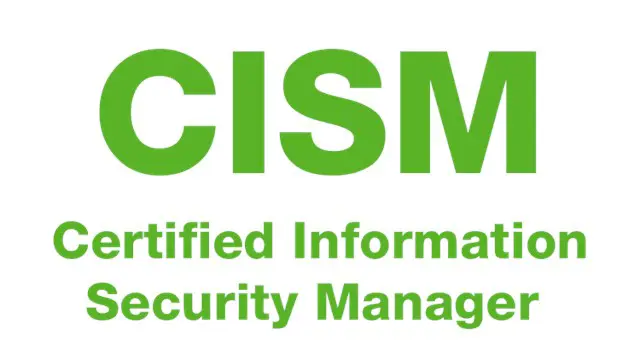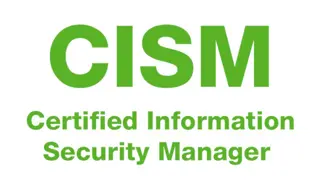
Certified Information Security Manager (CISM)
Virtual Instructor Led Course delivered online
Churchill Square Training and Development
Summary
- Tutor is available to students
Add to basket or enquire
Overview
Introduction:
In this course, students will establish processes to ensure that information security measures align with established business needs.
Objectives:
- Establish and maintain a framework to provide assurance that information security strategies are aligned with business objectives and consistent with applicable laws and regulations.
- Identify and manage information security risks to achieve business objectives.
- Create a program to implement the information security strategy.
- Implement an information security program.
- Oversee and direct information security activities to execute the information security program.
- Plan, develop, and manage capabilities to detect, respond to, and recover from information security incidents.
Resources
- Certified Information Security Manager CISM - download
Description
Course Outline:
1 – Information Security Governance
- Develop an Information Security Strategy
- Align Information Security Strategy with Corporate Governance
- Identify Legal and Regulatory Requirements
- Justify Investment in Information Security
- Identify Drivers Affecting the Organization
- Obtain Senior Management Commitment to Information Security
- Define Roles and Responsibilities for Information Security
- Establish Reporting and Communication Channels
- Implement an Information Risk Assessment Process
- Determine Information Asset Classification and Ownership
- Conduct Ongoing Threat and Vulnerability Evaluations
- Conduct Periodic BIAs
- Identify and Evaluate Risk Mitigation Strategies
- Integrate Risk Management into Business Life Cycle Processes
- Report Changes in Information Risk
- Develop Plans to Implement an Information Security Strategy
- Security Technologies and Controls
- Specify Information Security Program Activities
- Coordinate Information Security Programs with Business Assurance Functions
- Identify Resources Needed for Information Security Program Implementation
- Develop Information Security Architectures
- Develop Information Security Policies
- Develop Information Security Awareness, Training, and Education Programs
- Develop Supporting Documentation for Information Security Policies
- Integrate Information Security Requirements into Organizational Processes
- Integrate Information Security Controls into Contracts
- Create Information Security Program Evaluation Metrics
- Manage Information Security Program Resources
- Enforce Policy and Standards Compliance
- Enforce Contractual Information Security Controls
- Enforce Information Security During Systems Development
- Maintain Information Security Within an Organization
- Provide Information Security Advice and Guidance
- Provide Information Security Awareness and Training
- Analyze the Effectiveness of Information Security Controls
- Resolve Noncompliance Issues
- Develop an Information Security Incident Response Plan
- Establish an Escalation Process
- Develop a Communication Process
- Integrate an IRP
- Develop IRTs
- Test an IRP
- Manage Responses to Information Security Incidents
- Perform an Information Security Incident Investigation
- Conduct Post-Incident Reviews
Questions and answers
Currently there are no Q&As for this course. Be the first to ask a question.
Reviews
Currently there are no reviews for this course. Be the first to leave a review.
Legal information
This course is advertised on reed.co.uk by the Course Provider, whose terms and conditions apply. Purchases are made directly from the Course Provider, and as such, content and materials are supplied by the Course Provider directly. Reed is acting as agent and not reseller in relation to this course. Reed's only responsibility is to facilitate your payment for the course. It is your responsibility to review and agree to the Course Provider's terms and conditions and satisfy yourself as to the suitability of the course you intend to purchase. Reed will not have any responsibility for the content of the course and/or associated materials.


